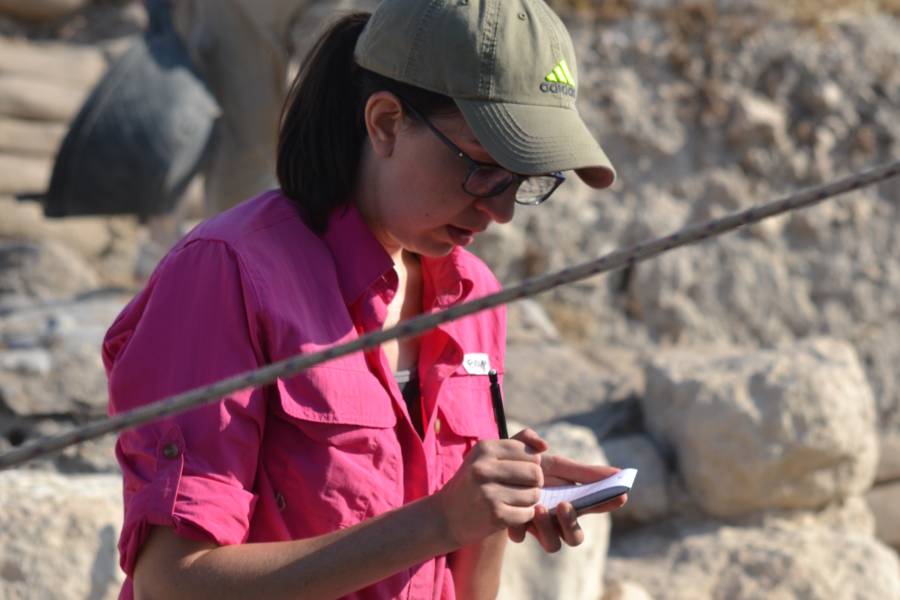Graduation Spotlight: Tel Gezer excavation provides training ground for Lipscomb’s newest archeology Ph.D. graduate
Charissa Wilson focuses doctoral research on Iron Age II material culture
Kim Chaudoin |

Charissa Wilson in the field in the Tel Gezer excavation in Israel.
Charissa Wilson’s journey to the ancient past is paving the way for a future generation of scholars.
This May, Wilson becomes only the third person — and the first woman — to earn a Doctor of Philosophy degree in Archaeology of the Ancient Near East from Lipscomb University. A Canyon, Texas, native and current middle school teacher, Wilson’s accomplishment marks a personal milestone and significant achievement for Lipscomb’s Lanier Center for Archaeology.
“I am very proud of the work that I have completed in my Ph.D., and I feel like I have contributed to the field through this process,” said Wilson. “Coming to Lipscomb was the right choice for me, and I think that I am well equipped for my next steps in teaching in higher education because of my time here.”
Wilson’s doctoral research focused on Iron Age II material culture in Israel, specifically the 10th century BC. Her work is part of the publication phase of the Tel Gezer excavation, a multi-year archaeological project led by the Lanier Center in partnership with institutions including Ariel University in Israel. She first encountered Tel Gezer as a volunteer during her master’s program and later served as a square supervisor for three consecutive excavation seasons.
While the fieldwork phase at Gezer concluded in 2017, Wilson remained deeply involved through the next chapter of the project: analyzing and preparing findings for publication. Thanks to the Lanier Center Research Fellowship, the first awarded to a student, Wilson spent nearly a year in Jerusalem from 2022 to 2023 working at the Tel Gezer archaeological lab.
“The work I did there was to organize the excavated and stored materials from our fieldwork while also conducting research of my own for my dissertation on Iron Age artifacts and ceramic remains,” she explained. “Work in the field is always a welcome challenge each excavation season to improve on techniques and methods … each dig season is rewarding when we take the time to further our research.”
Wilson holds a Bachelor of Arts in history from Dallas Baptist University and a Master of Arts in Archaeology and Biblical Studies from Southwestern Seminary in Fort Worth. She was midway through her studies when the opportunity arose to transfer into Lipscomb’s doctoral program.
“It was such a great opportunity to come to Nashville and have a new change of environment in a Christian university setting,” she said. “My time with the Lanier Center, whether in class or in the field, has given me plenty of opportunities to grow as a scholar alongside my peers, and I am leaving with a wider view on how our work in biblical archaeology can continue to thrive in the future.”
That growth has shaped more than just her academic career — it has also strengthened her faith. Wilson said her studies have affirmed, rather than challenged, her Christian convictions.
“In working in archaeology and studying the biblical text, the social and cultural backgrounds of the Bible and the archaeology of the Near East, I have not found these to conflict with one another when their study is framed as an ongoing conversation,” she said. “By choosing to work in biblical archaeology for a professional career, I wish to explore the world of the Bible and its people with one of the outcomes being the encouragement of Christ followers.”
Wilson’s passion for archaeology is driven by both a desire for scholarly excellence and a sense of spiritual purpose.
“My priority is to handle the word of God well, thereby strengthening orthodox Christian scholarship in the field of biblical studies and biblical archaeology,” she said. “I have always seen myself as a teacher, and therefore I will be pursuing professorial positions where I can help others understand scripture more deeply through the lens of archaeology.”